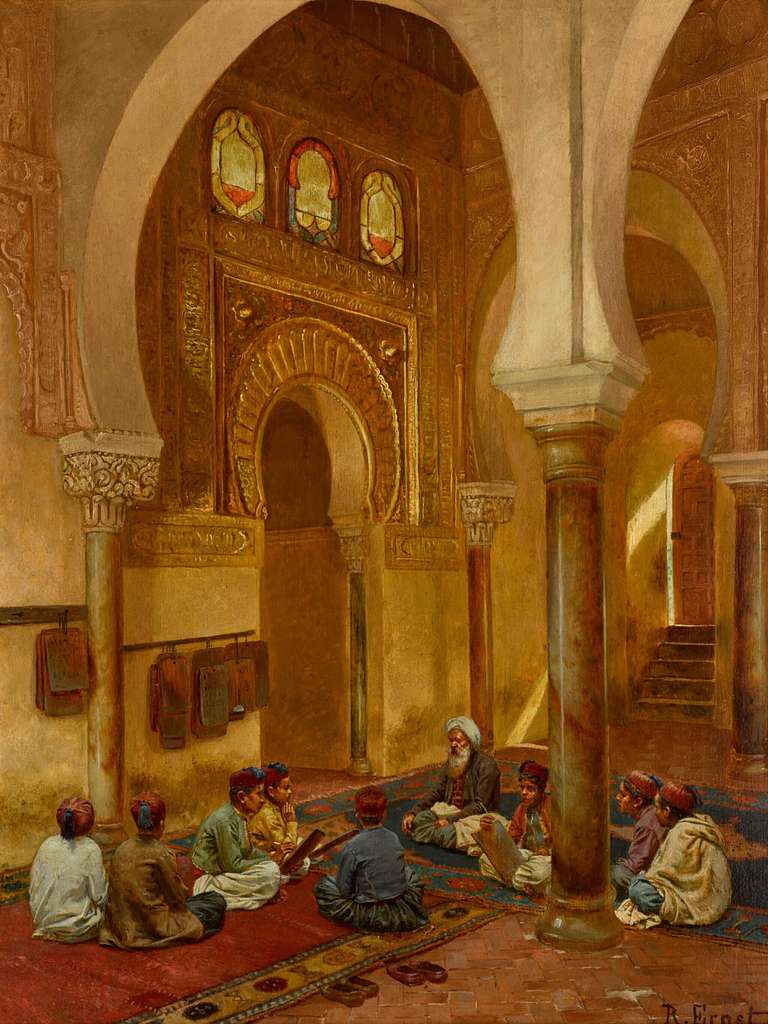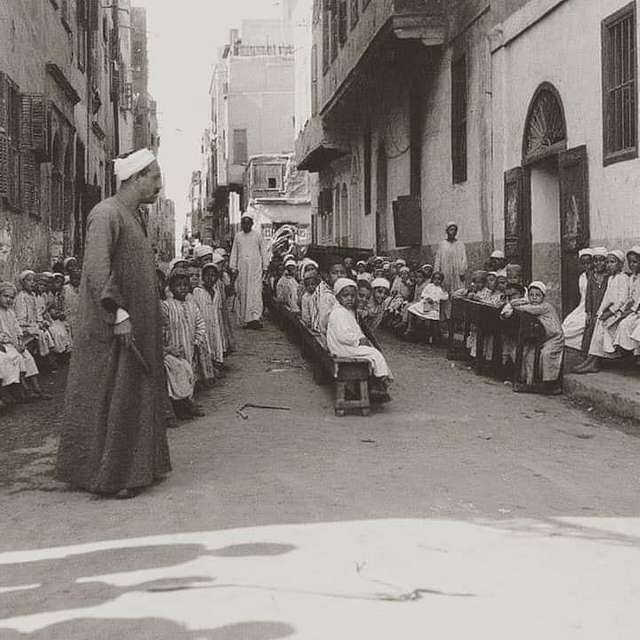CAIRO – 9 January 2025- After having almost disappeared, “Kuttabs,” the pre-school religious institutes that teach Arabic and Quran recitation, will officially re-open to revive their roles in pre-school education.
On December 22, 2024, the Ministry of Awqaf [Endowments] launched an initiative to reopen Kuttabs across the nation. The initiative aims to revive the Kuttabs’ role in reciting and memorzing the Noble Quran to prepare children for schools. The initiative was launched in Kafr El Sheikh Shehata village, Tala Center, Menoufia Governorate, according to a statement from the Ministry of Endowment on January 3.
The ministry noted in a statement that Kuttabs protect younger generations from extremist thought, and contribute to discovering talents in recitation, poetry, public speaking, memorization, and calligraphy. The ministry added that the idea of the initiative relies on five principles: Respecting all the universes created by Allah, honoring humanity by treating every human being with dignity, preserving homelands, contributing to human civilization, and disseminating our faith in Allah with insight and sincerity.
‘4,500 Kuttabs nationwide’
Since the launch of the initiative, the ministry has received thousands of applications to open Kuttabs, Spokesman of the Ministry of Endowment Osama Raslan told Egypt Today, noting that the ministry plans to establish a central Kuttab in each of Egypt’s 4,500 villages over a year. This is in addition to establishing Kuttabs in the annexes of some large mosques and other Maqraas.
Raslan revealed that the initiative was put forward by Minister of Endowment Osama Al-Azhari, and will be implemented in cooperation with an institutional network of NGOs, clarifying that the Ministry will be monitoring the work of those Kuttabs and the NGOs will help fund them to encourage the reciters. He also added that a cooperation protocol has been signed with the Food Bank to provide the Kuttab goers with meals, and that the Kuttabs will provide online recitation sessions for those who find it difficult to attend face-to-face.
“Kuttabs will never be alternatives to the Ministry of Education schools, but are supportive education channel to help the Ministry of Education,” Raslan affirmed.
According to Raslan, the reciters will sign a work document with the ministry that includes the rules and criteria they have to abide by to make sure they are scientifically and ideologically qualified to fight extremist thoughts and disseminate faith and knowledge among the new generations.
Additionally, the ministry has set criteria to ensure the venues chosen as kuttabs are safe and well-equipped, he said, noting that this initiative would help children avoid the misuse of social media.

A Brief about the Kuttabs in Egypt
The Kuttab lexically means “the place of the primary education.” Establishing Kuttabs dates back to 2 AH (the second year of the Prophet’s migration) when Prophet Muhammed -peace and blessings be upon him- had decided that the ransom for the Badr battle prisoners who had no money be that each of them teaches ten boys how to write and then be released, according to Mabrouk Bahi El-Din El-Daadar’s study “Kuttab: Their Origin, Patterns, and Impact on Learning and Teaching the Holy Quran...Kuttab in Egypt as a Model,” that also revealed Kuttabs played a significant role in teaching illiterate adults.
El-Daadar added that Kuttabs were established in Egypt in 640 AH in mosque schools. The education that took place in the Kuttabs and mosques was popular and was carried out by the people who established the Kuttabs for small fees. Some of the wealthy people also established various endowments to spend on these Kuttabs.
In a televised interview on the Nile T.V., Egyptian esteemed translator and linguist Sohair Al-Sokkary said the Kuttabs played a crucial role in introducing the Arabic culture to children between the age of 3 and 6 to the point that children could learn the 1000-verse poem of Ibn Malek, which collects all the syntactic roles of the Arabic language, by heart in a kttuab. Thus, they were fought by the French and British colonizers in the Middle East and North Africa through introducing westernized curricula, she said, citing a book “Militant Islam” by Godfrey Jansen in 1979.
The book also spoke about how the colonizing powers of France, Britain, Italy, and the Netherlands “deliberately mounted on the onslaught of mind of youth” through changing the education system. “Since Arabic and Islamic tendencies were looked upon as dangerous and subversive influences, they had to be excluded. Therefore, the new system that the colonial authorities introduced was wholly Westernized, and used European languages exclusively,” the book reads.
The Kuttabs started dwindling gradually when Kindergartens entered Egypt in 1913, but due to their positive impact on children, the Kuttabs did not totally disappear as some Maqraas (places where groups of people gather to recite Quran) still exist.
Al-Azhar Al-Sharif, Egypt’s top Islamic Sunni institute, tried to keep the Kuttabs alive in rural areas in the Delta and Upper Egypt, and in 2016, Al-Azhar decided to expand the establishment of Kuttabs in villages. In 2022, Al-Azhar also launched the initiative “The Child's Hall for Quran Memorization” and established Kuttabs inside Al-Azhar’s educational institutes. Upon its launch, the initiative was joined by 500,000 children, according to comments of the initiative supervisor on his Facebook page on May 30, 2022.

‘Widely-welcomed’
Egypt Today has interviewed several people on the subject that was widely welcomed.
“The return of the Kuttabs is a wonderful and cheerful news for me as a mother and a teacher, who has an experience with Arabic and non-Arabic speaking students,” said Ruqaya ElSaied, an Arabic teacher for non-Arabic speaking students.
ElSaied explained that the initiative is significant for several reasons; first, it was proven that Kuttabs are important for children to understand the concept of commitment from an early age. Secondly, Kuttab’s students are usually more self-confident and independent as the ability to memorize the Quran gives them a sense of achievement. Thirdly, memorizing part of the Noble Quran increases their Arabic vocabulary and activates their memory early on, qualifying them for their school studies, and lastly, the return of Kuttabs would enhance the children’s social skills and harness their moral and religious code.
“Those who learn Arabic and can memorize some of the Quranic chapters have a higher level of awareness, and psychological readiness to study. They are always ready and are more motivated than other students,” ElSaied continued. She also added that the child who learns at a Kuttab can read and write in three months at most, “while other students may take a year or more just to read and write.”
Yasmine El-Araby, a translator, wishes she had learned in a Kuttab at an early age as she discovered that learning and memorizing the Noble Quran enhanced her linguistic skills. Meanwhile, Lobna Fakhry, an English language teacher, is for the idea of establishing Kuttabs for children. “My father, may his soul rest in peace, used to tell me that he used to go to a Kuttab and had memorized the Quran. His pronunciation of the letters, even in normal speech, was precise and clear,” Fakhry said.
Hadir Abdel-Rahman, a mother of two boys who attend Quran memorizing lessons with a private reciter, hopes that Kuttabs are revived because of the important role they would play in education and in improving the speech of children, especially after she found out that her 6-year-old son’s speaking skills improved after learning to recite the Quran and stopped going to the speech therapist.
The utter welcome that the initiative has received reflects how Egyptian families are equally keen to root their rich Arab culture and legacy in their children on the one hand, and to educationally qualify them to contribute to the human civilization in general on the other.
Egyptians take pride in their complex identity, and are boastful of the prominent intellectuals and sheikhs who learned how to write and read in the kuttab before joining public schools, such as Noble Laureate Naguib Mahfouz and great writer and thinker Taha Hussein among others.
Comments
Leave a Comment